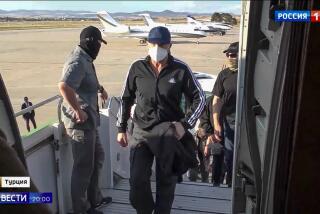Exclusive: Sundance documentary ‘Icarus,’ about Russian doping, could light another match under U.S.-Russia relations
When he went public with doping allegations last May, the Russian whistle-blower Grigory Rodchenkov told a remarkable story.
A long-serving chief of the country’s anti-doping program, Rodchenkov confessed that, out of the same lab designed to nab cheaters, he’d also secretly been running a state-sponsored doping program. During the 2014 Winter Games in Sochi, Rodchenkov said that, at the behest of Vladimir Putin’s government, he had used that watchdog lab to provide dozens of athletes with banned substances — then supervised an elaborate operation to swipe out their urine samples. No one was caught. Many went on to win medals.
FULL COVERAGE: 2017 Sundance Film Festival »
The account triggered a massive investigation by the World Anti-Doping Agency and has caused a furor in the international community (and a Russian PR counter-strike).
But Rodchenkov’s allegations would likely have never come to light if not for the unexpected involvement of one Bryan Fogel, a first-time documentary filmmaker with no previous connection to doping or the Olympics. [Note: The remainder of the story contains spoilers.]
In a little-known story that offers both a stumble into history and a rattle of geopolitics, Fogel — a Malibu-based comedian who created the stage hit “Jewtopia” — wound up a key player in a global scandal.
Almost by accident, the 42-year-old spent nearly two years intimately documenting the scope and depth of the alleged Russian doping program. He persuaded Rodchenkov to come forward to the American media last spring and blow the cover on the operation. And he stealthily made arrangements for Rodchenkov to hide in the U.S. when the whistleblower was forced to flee Moscow.
“When this story took on a completely different trajectory I was feeling exuberant — ‘Oh my God, this is going to be a ten-times greater movie than I ever imagined,’” Fogel said in a phone interview earlier this week. “And at the same time I’m going, ‘holy …. This is truly scary.’”
When the fruit of Fogel’s efforts — a documentary titled “Icarus” — premieres at the Sundance Film Festival on Friday, it will thrust the charged geopolitical issue of Russian doping into the cultural eye as it has rarely been before, while potentially providing a new jolt to the electric fence of modern U.S.-Russia relations. Though dealing with an at-times esoteric subject, “Icarus” has both the kind of scathing details and thriller-y hook to drive the scandal home in a new way.
“Icarus” began innocently. In the film (The Times was shown the movie before the festival), Fogel is seen wanting to tell a playful story in which he experimented with performance-enhancing drugs on himself. Fogel — who in addition to being a comedy writer is also a cycling enthusiast — had been fascinated with Lance Armstrong ever since longstanding doping allegations proved to be accurate. He wanted to test how much of an advantage PEDs actually gave riders.
With the backing from the New York documentary financier-producer Impact Partners, Fogel enlisted American anti-doping expert Don Catlin to help him dose up before an amateur race. Catlin then referred the director to Rodchenkov, a Russian athlete-turned-chemist at a Moscow site called the Anti-Doping Centre. That’s when matters took a turn.
Fogel — and viewers — initially believe Rodchenkov to be a minor player, a jovial mid-level functionary eager to boast of his chemical innovations, often in a kind of arrhythmic poetry. (“The best laboratory will be puzzled with your piss.”)
It soon becomes clear that Rodchenkov is much more. He’s the point man for Russian anti-doping efforts — and, it turns out, its doping ones too.
As the mustachioed 58-year-old confesses with surprising candor on camera, he had spent years helping to procure steroids for his countrymen and masking the effects, even as he worked to strengthen doping tests for athletes from every other country. Rodchenkov essentially played it from both sides: He extended the detection window so non-Russians could be caught at the same time as he developed a way (by mixing chemicals with alcoholic drinks) for the drugs not to bind in the bloodstreams of Russian athletes.
“You are on the first floor,” he says ominously to Fogel as he describes his operation. “There is a second floor.”
That upper level was dramatic and damning: Agents from Russia’s FSB security service positioned at sites around Sochi to facilitate the program. Tacit orders from Vitaly Mutko, the current Russian deputy prime minister who served eight years as Minister of Sport under Putin. All-night operations by candlelight to move jars of contaminated urine through secret tunnels.
When a WADA report in November 2015 put Rodchenkov as the mysterious figure at the center of the burgeoning scandal, “Icarus” filmmakers realized what they’d walked into.
“Once it became clear who Grigory really was, everything changed,” Dan Cogan, the co-founder of Impact and a producer on the film, said in an interview. “All of a sudden we’re thinking ‘how do we keep this person — or even us — safe from the Russians?”
Or as Fogel, his lighthearted persona growing more grave in the film, said in an interview: “It took me some time to realize that Grigory wasn’t the salmon — he was the great white shark.”
Rodchenkov admits his actions with a lack of restraint. And he isn’t shy about saying that the orders were coming from the highest levels of the Kremlin.
But as the movie progresses, Rodchenkov evinces a growing dread, worried about his government’s response. He flees to the U.S. Fogel and Cogan are now fully abetting him, setting him up in a Southern California safe house. Several weeks later, two of Rodchenkov’s colleagues die in mysterious circumstances. Fogel and producers urge Rodchenkov to go to the New York Times, saying he’ll be safer if he’s known to the public.
The newspaper’s story in May lands like a smoke bomb. It reignites the WADA investigation, with a commission convened under anti-doping crusader Richard McLaren. The McLaren Report, as the two-part findings are known (the second part released just last month), is a blistering affair that confirmed nearly all of Rodchenkov’s allegations, concluding that a sophisticated state-run system had helped more than 1,000 Russian athletes dope between 2011 and 2015.
It recommended that all Russian athletes be banned from Rio in August. The IOC ignored the group and allowed three-quarters of Russian athletes to participate.
With the story exploding and the danger to Rodchenkov growing, the U.S. government put him in protective custody. His whereabouts are not currently known, a development that plays like a cliffhanger in the film.
The film will advance McLaren’s cause, providing both a face to the scandal and the specificity of an on-camera confessional. While informed viewers will already know about the program from both the WADA reports and a 2014 documentary by the German network ARD, the effect of “Icarus” is different. The best comparison might be to Laura Poitras’ “Citizenfour”: Though the basics of the Edward Snowden story were already known, the intimacy of being in the room with him cast a new light on the controversy.
Such exposure could shift public perception on the Russia-hosted World Cup in 2018 and, more broadly, further turn Americans against Russia at a post-election moment when hostilities are already high.
Much of that of course depends on who buys the film at Sundance and how widely it is distributed.
The backers of “Icarus” are optimistic that it will be seen by a larger number of people than usually see many documentaries and create water-cooler conversation besides. “This is a movie that starts out as ‘Super Size Me’ and ends up a riveting real-life thriller,” said Rena Ronson, head of United Talent Agency’s Independent film group, which is selling the movie at the festival. “I think there’s a huge audience for it.”
The parallels between doping and hacking also won’t be hard to draw. “I see this as very similar to the election,” Fogel said. “This is also a case where there’s not just a smoking gun but bullets and blood. And then you have someone saying there isn’t even a body.”
In fact, the connection between the two scandals may be even more direct: The U.S. intelligence report that was declassified earlier this month suggests that the doping scandal and the shame it brought may have partly motivated the Russian hacking. “Putin publicly pointed to the Panama Papers disclosure and the Olympic doping scandal as US-directed efforts to defame Russia, suggesting he sought to use disclosures to discredit the image of the United States and cast it as hypocritical,” the report said.
In public, meanwhile, the Russian response was swift and clear: Rodchenkov was a lone wolf.
“He is confusing himself with the government,” Mutko said. A Putin spokesman called Rodchenkov’s accusations a “turncoat’s libel.”
The filmmakers, on the other hand, take an unabashedly heroic view of Rodchenkov and have become de facto advocates for him, the kind of filmmaker-subject closeness that is bound to stir debate in documentary circles.
The even bigger question may be whether Rodchenkov is a true hero or someone acting with a more complicated set of motives. After all, he initially agrees to be on camera primarily to boast of his methods, and he comes forward to the New York Times not so much in spite of the dangers but to save himself.
It also remains unclear to what extent he was coerced into perfecting this doping system as opposed to embracing that role voluntarily — a key difference.
Still, the filmmakers leave little doubt about their belief that Rodchenkov was simply a pawn and that viewer ire should be directed at a much larger target.
“We have this idea in society that there’s a system in place, and even if there are fallacies, there’s a policing mechanism that will try to do its best,” Fogel said. “Then you realize that the police are actually working for the head of government and with the athletes, that everyone is in cahoots to cheat. And that’s a shocking realization.”
See the most-read stories in Entertainment this hour »
Twitter: @ZeitchikLAT
More to Read
Only good movies
Get the Indie Focus newsletter, Mark Olsen's weekly guide to the world of cinema.
You may occasionally receive promotional content from the Los Angeles Times.











